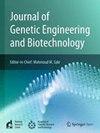Plant-based edible vaccines: Can cholera be the case study in Africa?
IF 2.8
Q3 Biochemistry, Genetics and Molecular Biology
Journal of Genetic Engineering and Biotechnology
Pub Date : 2025-06-23
DOI:10.1016/j.jgeb.2025.100527
引用次数: 0
Abstract
Vaccines are employed as a sanitary approach that is implemented to lessen the hurdles caused by infectious diseases on the safety of public health. A vaccine is biologically made from inactive components of microbes, to enhance immunity and as a defense mechanism adverse to parasitic, bacterial and viral illnesses. Nonetheless, the mode of production that involves purification is quite costly, more so, to low and middle-income countries, especially in Africa. Conventional oral cholera vaccines, though commercially available, face logistical challenges to be transported and distributed to target populations such as Africa. Edible vaccines derived from plants, on the other hand, offer cost-effective and bio-friendly production cost, they are easily administered to all age groups and can be grown near-user-site. This article thoroughly assesses the capability of plant-based edible vaccines as an option for immunization against cholera with exclusive concentration on the African continent.

植物性可食用疫苗:霍乱可以成为非洲的案例研究吗?
接种疫苗是一种卫生方法,旨在减少传染病对公共卫生安全造成的障碍。疫苗是由微生物的非活性成分制成的生物,以增强免疫力,并作为对寄生虫、细菌和病毒疾病不利的防御机制。然而,涉及净化的生产方式是相当昂贵的,对低收入和中等收入国家来说更是如此,特别是在非洲。传统的口服霍乱疫苗虽然可以在市场上买到,但在运输和分发给非洲等目标人群方面面临后勤方面的挑战。另一方面,从植物中提取的可食用疫苗具有成本效益和生物友好型的生产成本,它们易于对所有年龄组进行管理,并且可以在用户现场附近种植。本文全面评估了以植物为基础的可食用疫苗作为非洲大陆霍乱独家集中免疫的一种选择的能力。
本文章由计算机程序翻译,如有差异,请以英文原文为准。
求助全文
约1分钟内获得全文
求助全文
来源期刊

Journal of Genetic Engineering and Biotechnology
Biochemistry, Genetics and Molecular Biology-Biotechnology
CiteScore
5.70
自引率
5.70%
发文量
159
审稿时长
16 weeks
期刊介绍:
Journal of genetic engineering and biotechnology is devoted to rapid publication of full-length research papers that leads to significant contribution in advancing knowledge in genetic engineering and biotechnology and provide novel perspectives in this research area. JGEB includes all major themes related to genetic engineering and recombinant DNA. The area of interest of JGEB includes but not restricted to: •Plant genetics •Animal genetics •Bacterial enzymes •Agricultural Biotechnology, •Biochemistry, •Biophysics, •Bioinformatics, •Environmental Biotechnology, •Industrial Biotechnology, •Microbial biotechnology, •Medical Biotechnology, •Bioenergy, Biosafety, •Biosecurity, •Bioethics, •GMOS, •Genomic, •Proteomic JGEB accepts
 求助内容:
求助内容: 应助结果提醒方式:
应助结果提醒方式:


